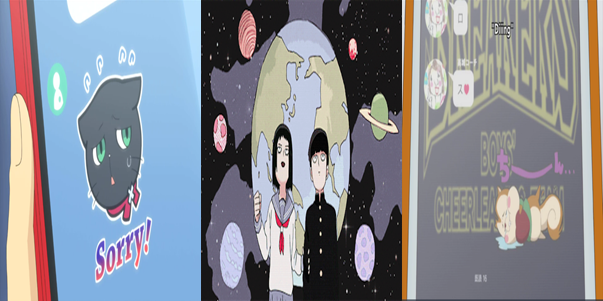
Thoughts on Good Shows™.
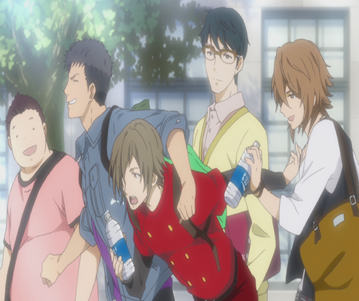
Cheer Boys
“Feels like it could be a special show that subverts our general presumption.”
The achilles heel of this show is similar to Battery’s: lack of compelling visual on its actual subject matter. In Cheer Boys’ case, it’s more to do with quality than quantity. They explained the basics well (particularly helpful for yours truly, who have never seen any cheerleading in person), but when it comes to actual cheerleading scenes, there‘s a glaring lack of imagination on the showrunners’ part. These scenes don’t convey the excitement you’d expect from this type of show, with most of the ‘big performance scenes’ giving the impression that we’re watching montage of stills instead of dynamic and fluid choreography. In a world where Shouwa Rakugo, Sound!Euphonium, Your Lie in April, and a bunch of idol shows produced memorable bursts of flair in their respective performance scenes, this deficiency sticks out like sore thumb.
That said, I enjoyed the hell out of this show.
The narrative and character dynamics are nearly my perfect comfort food in terms of ‘passion drama’ genre, with the added novelty value of subject matter and choice of setting (college). What’s most impressive about it is how the script juggled around a dozen characters and made me care for every single one of them and their respective issues. These are relatively simple characterization and individual arcs, but it’s not simplistic. Neither it is overwrought, with good-natured humor, touch of authenticity, and a bit of playfulness with gender norms paving the way for something that’s genuinely uplifting. Cheer Boys could’ve been one of the best shows this year if only it has some visual pizzaz, but really, a show that makes me think ‘man, I wish I can spend more time with this crew’ isn’t a bad compromise at all.
Stray Thoughts:
~The animation and visual direction may be lackluster, but I actually like the general art style. There’s lot of personality in it, from the diverse and distinct character design to the details paid to the characters’ attire. Don’t forget the disarming cuteness of Risujiro, or the hilarious recurring gag of ‘Sho, the King of Fashion Disaster.’
~Gotta admit, I laughed out loud at Haru’s heartbreak scene. It’s a great twist that I seriously don’t see coming, building up a romantic sub-plot for our main character only to subvert it at the very end. Really like the light-hearted and positive tone about it too, with poor Haru ultimately responding in the best way possible. Not every romantic failure needs to be high drama!
~Luck Life’s Hajime no Ippo! (*yeah, probably fans of that series) is such a splendid OP that kept growing on me throughout the show. The perfect kind of ‘start your day and work in high spirit’ song, and a terrific fit with the show’s ethos.
~Apparently Ryo Asai’s source novel had been published in my country! Let’s see if I can find a copy…
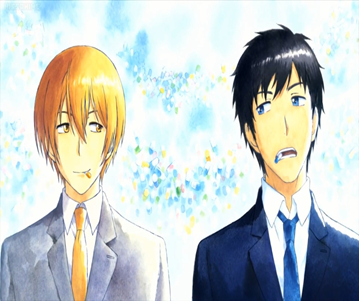
Re:Life
“In spite of the redundancy and obvious problematic possibility (the key images already show the main character flanked by two high-school girls, presumably oblivious of his true nature), I’ve heard convincing praises about the source material, though. So, let’s think positive without expecting too much.”
Okay, so the show is pretty much the best case scenario I had envisioned for it. Most of Re:Life is low-key high school dramedy + romance, seen through the POV of a jaded salaryman. That filter ended up being the show’s key feature, mining a good deal out of its ‘fish out of the water’ comedy as well as providing occasional reflective moments that refused to over-reach into high drama territory.
A huge part of my enjoyment is watching Arata re-adjust to his new environment and help out his younger peers with the knowledge and wisdom he acquired as a working adult. I like how the writer portrays him not as a stereotypical NEET, but as a good-natured and fundamentally sound guy disenchanted by toxic office culture. He makes an effective main character, and the show is noticeably weaker when he’s not around. Still, there’s general lack of annoying high school anime tropes, and the cast is pretty likable (even if I don’t quite find Rei Ayanami Clone #3,22001 Hishiro believable). It successfully avoided going down the problematic route too, making for a very fine show with well-measured tone.
Stray Thoughts
~The visual execution is just so-so, but it nailed its comedic timing more often than not and managed transition to ‘chibi phase’ in a less jarring manner than a lot of shows I’ve recently watched.
~On one hand, a different song and ED imagery for each episode! On the other hand, none of them is particularly memorable. The show also leaned very heavily on a few number of background piano tunes to convey the mood of a given scene, done at annoyingly high frequency and with minimum finesse.
~The twist regarding Hishiro is one of those that feels like obvious in retrospect, but I guess the most significant thing about it is that it neatly removed the problematic issue that prevented her and Arata from getting into the proverbial ship—even if they’re not quite aware of it yet by the show’s end. In that sense, I’m satisfied enough with the show’s ending and somehow don’t really feel the burning need to see the narrative’s continuation and resolution in either a (hypothetical) second season or the comic, but we’ll see.
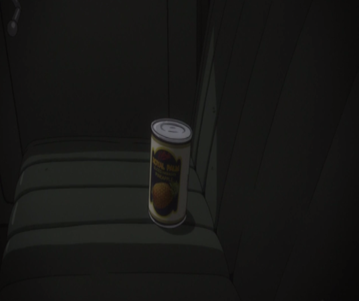
91 Days
“The previews, however, suggested a sort of edgy and overwrought vibe that don’t necessarily agree with my taste, not least of which signified by the shot of main protagonist flashing a Psycho Grin…”
Another show that responded to my concerns in the best way! I’m comfortable enough calling 91 Days the finest non-supernatural non-procedural crime drama anime I’ve ever watched (*with the caveat that there’s really not much competition for that title). A tribute to the mafia spectacle very much in the vein of the Godfather series, the show proved to have the right tone and uncompromising attitude that its narrative demands. It’s true that there’s at least a dozen American TV shows (and Korean films) that out-executed what it’s doing, but it has enough strengths to stand on its own and is a rare addition to the medium of anime.
Life, as the show’s narrative presented it, is a cruel game of fate where people’s motivations clash against one other to horrifying result. They sure don’t back down on such premise, lacking unnecessary plot twist, anime-esque shenanigan, or even melodramatic contemplation along the lines of ‘I want to take revenge against these monsters, but who is the real monster now??’ Just a ruthless narrative so immaculately composed and storyboarded throughout its run.
Nonetheless, there’s very little else in this other than the dark fascination at seeing a bunch of chess pieces falling one by one in increasingly tragic fashion. If you’re not interested in such a thing, I don’t suggest watching the show. As much as I like it, there’s also not enough stand-out scenes or constructive elements that would compel me to re-visit it someday. Those days watching it sure don’t feel wasted, though.
Stray Thoughts:
~While I won’t really recommend this for its periodic depiction alone, I think the show did a fine job paying homages to Prohibition era and the corresponding gangland warfare—or more exactly, to the kind of classic narrative works that take place in such setting (apart from a few scenes in the early goings that tried a bit too hard at being So Italiano and So Godfather, that is). The set design and especially the soundtrack are worth a mention in particular.
~The ambiguous and downbeat ending: I don’t love it, but I don’t hate it. It’s a textbook execution of that kind of ending, which is pretty common in such narrative where the protagonist had clearly passed over the point of no return.
~Best exchange: ”You have a younger brother?” “Yes, I’ll let you see him soon.”
~Those CG car scenes, though. Distracting as hell.
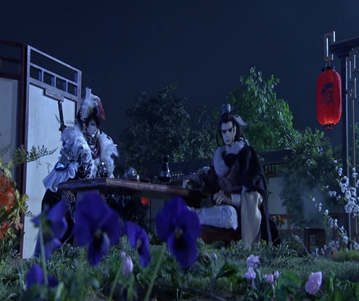
Thunderbolt Fantasy
“Watching stoic-faced puppets performing gravity-defying stunts while ‘acting’ in a cheesy melodramatic fantasy plot should be great times.”
Hot damn, those guys in Pili sure know their stuff. The puppets in this show are a marvel to behold, showing off intricate details and movement that look far better than a lot of digitally animated action scenes out there, whether in anime or other media. There’s not a single moment of me suffering from the Uncanny Valley effect, which is another very impressive fact in itself. Huge props to the designers, puppeteers, and voice actors for making ‘Puppets: Elite Duelists & Thrash Talkers’ seem like the most natural thing in the world, even for a greenhorn like me who’s watching this kind of show for the very first time.
As for the narrative itself, it’s a classic (read:boilerplate) set-up where a band misfits traveled to the lair of an Evil Boss and his henchmen. A quest for sacred weapon, where characters yell their signature moves and eventually a sealed ancient evil is awakened! Of course. That’s basically the set-up of every RPG scenario ever, complemented with setting and character design straight out of a cheesy wuxia fare. This combination turned out to be a winning one, thanks largely to the operatic staging and innate charm of its characters. This is a show driven by the interaction between the characters, and it’s plenty of fun in itself to watch all the verbal jousting, poetic grandstanding, and fancy soliloquy between them. The enigmatic duo of grumpy swordsman Shang Bu Huan and magic thief Lin Xue Ya alone provided more entertainment than the rest of the cast combined, and in general the show sported the exact kind of tone that I wanted from this kind of narrative: more than capable of light-hearted and jokey moments, but manage to take things seriously and earnestly when the situation calls for it.
Stray Thoughts:
~I think we’ve found the best battle scenes in anime any visual media this year. Normally I prefer a realistic and grounded combat instead of fantastical and cheesy ones, but I’ making exception this time because, come on now, puppets! Well, the battles in Thunderbolt Fantasy could get a bit too frantic and hard to follow at times, but that doesn’t negate the incredibly fluid blend of CG and puppetry stop motion. There’s just the right amount of battles that showcased a diverse range of characters and fighting techniques, paced perfectly so none of them ever feel too drawn out.
~My favorite scene in the series has to be the conversation between Shang Bu Huan and Sha Hu Sheng in the Devilwood Flower Garden (Episode 5), specifically the part where the former spell out the possible action and counter-action between the two while the visual plays out what he’s envisioning. Terrific storyboarding that conveys the liquid tension of the situation perfectly. Another one is the hilarious sequence where Bu Huan impersonates Lin Xue, and proceeded to perform the worst acting job of all time.
~Seems like relatively anti-climactic finale is in vogue now? First ONE, and now this, where our two main characters are revealed to be devastatingly more powerful than everyone else and resolved the Final Battle(s) with cockroach-smashing ease. It’s a bit disappointing to have massively overpowered protagonists in your action shows, but at least these two (and their show) have tons of amusing attitude to make up for it. Excited to see what’s in store for the eventual second season!
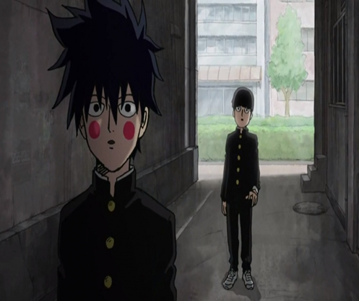
Mob Psycho 100
“Gotta say that it comes off like flashy nonsense to me, and the ‘cold fish’ look and mannerism of the main character doesn’t help.”
Mea culpa. Seriously, mea culpa.
The production line-up for this is nothing short of impressive, and it shows. Renowned sound director Kazuhiro Wakabayashi and legendary composer Kenji Kawai produced remarkable sonic output, Yoshimichi Kameda spear-headed an animation department that generated endless reels of showstopping visual, and there’s a rising star at the director’s helm who only re-affirmed his tremendous capacity and vision with this project. Further, this is the one series that truly incited my newfound appreciation for its original author’s storytelling chops.
Granted, the narrative isn’t one hundred percent perfect. The second half is noticeably weaker than the first, mainly because I have little interest with the Evil Organization stuff (even with the unconventional/satirical way they’re handled, one-dimensional goons are just that: one-dimensional goons. ONE is yet to create a truly compelling villain character for me). However, Shigeo/Mob is a far more compelling and sympathetic lead than the preview led me to believe. The sibling rivalry between him and Ritsu, as well as his dynamics with Reigen, are the kind of emotional threads strong enough to anchor a whole show. The humor can be kind of hit-and-miss, but there’s a big beating heart within the whole narrative and lots of memorable moments buoyed by great technical execution.
The DNA of Mob Psycho 100 can be traced back to the ‘psychic boom’ in Japan circa 1980s, which gave rise to a bunch of narrative works starring esper teens. The show is simultaneously a satire and homage to the pop culture of the era, but it’s also more than just a more sympathetic Akira, more humorous Psychic Girl Mai, or more talkative Mother. More than anything, it is Mob Psycho 100, an oustanding piece of narrative and spectacle.
Stray Thoughts:
~Reigen: one of the instances where my opinion did a 180 from ‘man this guy’s gonna be annoying as hell to watch’ to ‘such a great character!!’. What a talented bullshit artist, he even managed to conned me into liking him.
~The third episode with the cult is the tipping point where I really sit up and take notice. The first two episodes already impressed me with its craft, but I wasn’t sure yet that the plot and characters are to my liking, until this came along. Unnerving and whimsical in a way that reminds me of Mother (a video game series that I hold in very high regard), it climaxes with a sooner-than-expected ‘Mob Explosion’, a visually impressive and emotionally resonant moment that convinced me the show is one for keeps.
~I try to avoid constant comparisons between this and that one other series, but I’ll just say this: as far as my personal preference goes, Mob blows Saitama’s baldy head out of the water.
~ Yusuke Murata’s art work is undeniably great, but I always have soft spot for the rough charm of ONE’s art in One Punch Man. The art direction in Mob Psycho 101 refined and brought his distinct flair to the fore, complemented by some truly impressive storyboarding. The show’s optics go beyond just ‘looking flashy for the sake of looking flashy’ (although all the psychic blast, barriers, and effects do look nice), it’s executed with elastic unpredictability that underlines the stakes and consequences of each confrontation, and the whole product basically has the best visual direction and cinematography I’ve seen all year this side of Shouwa Genroku Rakugo Shinjuu.
~Yuzuru Tachikawa (direction and storyboard): one hell of a talent. Having impressed last year with Death Parade , an original work and as good a directorial debut as you can expect, he can now add this wonderful adaptation job to his resume. That’s the kind of one-two punch that propelled him into check-out-anything-with-his-name-on-it status with me.
And that’s a wrap for the shows that aired on summer 2016! I guess I can start catching up to the new shiny toys from this fall season now… which is already halfway done, apparently. Anime season sure come at you fast. Anyway, since I’m already behind and all, I figure why not add to the ‘Late to The Party’ feel of this column by talking about shows from further back that I also happened to watch recently.
This show here is pretty obscure though, you probably never heard of it.

Attack on Titan
Right, I somehow never consume any Titan-related media before last year, when a fan of the anime dragged me to watch Part 1 of the live action movie. I like what I saw there, and proceeded to watch the anime series when it popped up on IFlix’s anime line-up. While coming late to a pop culture juggernaut means that I’d been exposed to inevitable spoilers through the osmosis, the nice thing about this timing is that you’re less prone to take side between the sort of heat-of-the-moment takes this kind of show tends to invite. As with a vast majority of things, Attack on Titan is neither “the greatest thing to happen to anime since Doraemon!!” (that’d be Shin Atashin’chi, thank you very much) or “hot overrated trash that only succeeds through shock value!!”. In my humble opinion, it exists somewhere in the middle between those two extremes, leaning more to the positive side.
In retrospect, it’s a bit surprising to see a show whose whole narrative is basically ‘the good guys keep getting pummeled and anniehillated, barely making any progress throughout’ earned so much mainstream adoration. I guess there’s certain appeal in seeing desperate protagonists pushed to the absolute brink, and the show does provide a lot of popcorn-munching entertainment in that regard. It remained pretty exciting for me even after the initial shock value wears off, thanks to genuinely compelling mystery and well-defined (if not exactly well-developed or fleshed out) characters.
With the caveat that I don’t read the manga and thus can’t make a comparison, I don’t think Tetsurou Araki’s direction is such a bad fit. It’s loud and bombastic, sure, but this is literally a story about acrobatic military swordsmen vs. ugly-ass skyscraping monstrosities, with a dose of Super Saiyan-esque shenanigan. Not much room for subtlety there. I do agree that several scenes should’ve been handled with more nuances, with Annie Leonhart’s pivotal moment near the end immediately coming to mind. The series composition could also stand to be more effective (I don’t think ‘The Struggle for Trost’ and ‘Exterior Scouting Mission’ arcs need 9 and 6 episodes respectively), but overall it’s built very well as a tune-in-next-week-to-see what-happen thrill ride. It generated plenty of “omg did you see last episode!?” discussion by having ample amount of fluid action scenes, surprising developments, and forward momentum, and that’s a genuine asset.
Stray Thoughts:
~The show isn’t quite in the ‘must-turn-off-brain-to–enjoy’ territory, but it certainly requires plenty of suspension of disbelief and acceptance towards narrative shortcuts. There are also plot holes (particularly in regards to the world’s nonsensical chain of command and defense system), but I’ll reserve judgment until we see more world-building and (hopefully) concrete answers in the upcoming season.
~I’ll be watching the second season, but I’m not immersed to the extent that I’ll check out the manga, let alone the side-stories, prequels, midquels, and whatever-quels this thing continues to spawn. Okay, maybe the Junior High spin-off.
~The two ED sequences are very good, both in terms of visual and song used within the context. Love the art style and animation used to depict Mikasa in the first, and the presentation of the main characters on two different sides of the wall.
~
And so, we end with a giant wall and fearsome creatures attacking human for apparent lulz. Kind of fitting. Take care of yourself, until next time~
Looking back, Mob Psycho 100 resonated my heart strings and I think is my Summer 2016 Anime. It says a lot since I am not a fan of action-oriented series. The characters are probably the reason since:
1. Mob has a palpable personality as compared to his peers in the genre.
2. Reigen turned out to be my most favorite male lead this year.
Well, that aside, I really love how MP 100 inject social commentaries on fitting in to the group and so with Reigen’s lines during episode 11. Those give me shivers to be honest.
LikeLiked by 1 person
Yeah, gotta agree with everything you said there. There’s a lot of great stuff going in the show, and the lead characters are really at the heart of it. Mob and Reigen have one of the most effective and interesting relationships I’ve seen from this genre, likewise with Mob and Ritsu.
LikeLike
Attack on Titan was what compelled me to see anime as more than children’s entertainment (Fate/Zero was what solidified my interest, though). The “bones” of the story and character development beats aren’t very original, but the presentation of the tone and conflicts felt palpable to me. No matter what advancements were made, the odds still seemed firmly stacked against humanity and the plot, despite not quite having a clear end goal, the series never felt like it was wasting my time (sorry Hibike). I think ANN’s reviews of it do the best job at presenting its appeal.
LikeLike
Interesting, I previously thought this show could not work as gateway anime, but I was apparently wrong. Definitely has high crossover appeal to non-anime fans, too.
I also see the protagonists’ lack of progress as a feature rather than a flaw, especially since I consider the entire first season as build-up and am pretty fine with it. Gonna have different expectation for Season 2, where I presume is where the pay-offs and answers are gonna be at. Since this is a show driven by its plot and mystery more than anything else, I can see my final opinion shifts to either extreme depending on how the complete picture looks.
LikeLike